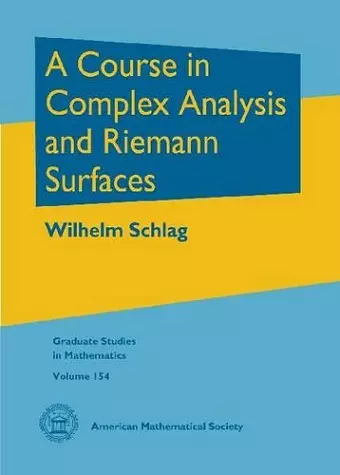A Course in Complex Analysis and Riemann Surfaces
Format:Hardback
Publisher:American Mathematical Society
Published:30th Aug '14
Currently unavailable, our supplier has not provided us a restock date

Complex analysis is a cornerstone of mathematics, making it an essential element of any area of study in graduate mathematics. Schlag's treatment of the subject emphasizes the intuitive geometric underpinnings of elementary complex analysis that naturally lead to the theory of Riemann surfaces.
The book begins with an exposition of the basic theory of holomorphic functions of one complex variable. The first two chapters constitute a fairly rapid, but comprehensive course in complex analysis. The third chapter is devoted to the study of harmonic functions on the disk and the half-plane, with an emphasis on the Dirichlet problem. Starting with the fourth chapter, the theory of Riemann surfaces is developed in some detail and with complete rigor. From the beginning, the geometric aspects are emphasized and classical topics such as elliptic functions and elliptic integrals are presented as illustrations of the abstract theory. The special role of compact Riemann surfaces is explained, and their connection with algebraic equations is established. The book concludes with three chapters devoted to three major results: the Hodge decomposition theorem, the Riemann-Roch theorem, and the uniformization theorem. These chapters present the core technical apparatus of Riemann surface theory at this level.
This text is intended as a fairly detailed, yet fast-paced intermediate introduction to those parts of the theory of one complex variable that seem most useful in other areas of mathematics, including geometric group theory, dynamics, algebraic geometry, number theory, and functional analysis. More than seventy figures serve to illustrate concepts and ideas, and the many problems at the end of each chapter give the reader ample opportunity for practice and independent study.
[T]his is an extremely valuable textbook for graduate classical complex analysis in one variable both for lecturers and students not following the increasing standardization trends of student's curricula... The presentation style is excellent, a very well contemplated pleasant reading throughout, rich in interesting outlooks. I recommend this work to all the mathematical libraries at universities as an extremely helpful material in teaching or studying complex analysis." - László L. Stachó, ACTA Sci. Math.
ISBN: 9780821898475
Dimensions: unknown
Weight: 846g
384 pages